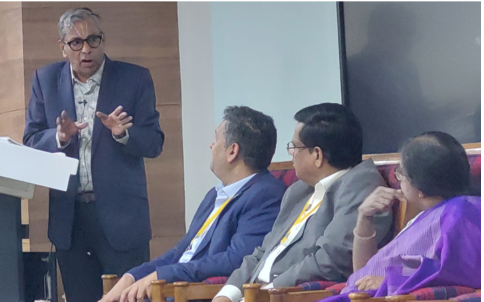International Conference paper
AI is fine; but the need is for originality.
Prof M Sridhar Acharyulu, First Dean of Mahindra University, former Professor Nalsar, and formal Central Information Commissioner of Government of India, New Delhi, said three points before International Conference at Mahindra University, on 29th February 2024.
The huge amounts of data generated and shared online enabled businesses, governments, and organizations to make possible decisions. Such data contains sensitive information that individuals may not want to share without their consent. This is the main problem of privacy. It gives rise to the question: ‘How to protect personal information confidentially and prevent unauthorized access.’ Most of the individuals may not even be aware that their data is being used to make decisions that affect them. These are serious constitutional issues and regulatory governance. What if this data falls into the wrong hands or quarters, such as identity theft or cyber-bullying. Other issues are the potential for bias and discrimination, especially in Indian social life. They may lead to discriminatory decisions that affect individuals based on factors such as race, gender, or socio-economic status.
Constitutional Issues
The important constitutional issue may be biased against women or people of colour, or use of data to unfairly exclude them from consideration. This can lead to job displacement, economic disruption in certain industries, and the need for individuals to retrain for new roles. The AI can be used and misused to create convincing fake images and videos, which can be used to spread misinformation or even manipulate public opinion. Some of these issues include invasive surveillance, which can erode individual autonomy and exacerbate power imbalances. Certain systems may be used as a valuable tool in the fight against crime and terrorism. It raises concerns about privacy and civil liberties. (Dr Mark van Rijmenam, CSP, Feb 17, 2023, https://www.thedigitalspeaker.com/privacy-age-ai-risks-challenges-solutions/#:~:text=One)
The executive must restrain the zealous over-regulation to guard citizens’ fundamental rights and constitutional guarantees.
All this should be protected for the good of the nation or it may lead to over-regulation and heavy constitutional powers. Another recent example is: Is it ethical to use AI to clone voices for creative purposes? Sai Shravanam and Haricharan Seshadri raised the question with The Hindu Srinivasa Ramanujam. The Editors explained: “Today, AI systems are rapidly proliferating. They engage in various aspects of human activity and are becoming increasingly powerful and invasive.… The all-pervasive nature and cross-border applications of AI have opened up Pandora’s box of questions related to ethical ambiguities, harm, biases, trust, and accountability. Such challenges have prompted inquiries into whether AI should be governed based on certain fundamental value orientations”. (Sai Shravanam & Haricharan Seshadri, February 16, 2024, https://epaper.thehindu.com/reader?utm_ source=Hindu&utm_medium=Menu&utm_campaign=Header)
Author Sai Shravanam says: Ethics is personal. … An atomic bomb is an incredible invention, but it has been put to harmful use. The invention is not the problem; there is an issue with how humans use it”. They referred, recently, to the case of music composer A.R. Rahman, who tweeted that the song Thimiri Yezhuda from the Tamil film Lal Salaam used Artificial Intelligence (AI) software to recreate the voices of singers Bamba Bakya and Shahul Hameed.
Governance legal issue:
The AI is more advanced, and thus, it raises several legal issues. The AI is an international governance-related legal issue, as it is borderless. AI cannot be used indiscriminately, ignoring ethical ramifications. First, undoubtedly, the legal issue is data privacy and protection—and second, the transparency and ethical questions relating to AI. The business should provide evidence of its fairness, accuracy, transparency, and conformity with ethical questions.
Australian case
Recently in Australia, a man considered filing a defamation lawsuit against ChatGPT after it falsely claimed that he had spent time in prison. These models could even violate companies’ privacy policies. Generative artificial intelligence raises new questions about data use and how content will be legalized. It could be a near impossibility, without infringing the Constitutional rights of the democratic people. (Dylan Walsh, Aug 28, 2023 https://mitsloan.mit.edu/ideas-made-to-matter/legal-issues-presented-generative-ai.)
Ethical and intelligent
The AI law poses a threat to regulatory frameworks. AI needs to be developed ethically. The over-regulation of AI may curb intelligent brains’ freedom and free thinking. The freedom, of course, goes with reasonable limitations on thinking. (John Giles, January 16th, 2023, https://www.michalsons.com/blog/ai-law-according-to-chatgpt/63492)
Three points need to be discussed.
1. Original intelligence is the reason for artificial intelligence. AI shouldn’t kill OI. It should encourage. AI, all of us should use AI to increase OI.
2. The value of a good system and good governance of the system should be incorporated by liberty democratic and constitutional morality, India, i.e., Bharath, or China or the US.
3. For instance, I want to explain the need for originality. Now, they are struggling users AI to do translation. It is a big challenge. But AI made it 70 percent possible from Telugu to English. But English to Telugu is very difficult, different, and terrible to understand.
It means there is a huge place for original intelligence. Let us work together to improve this in our International Conference.




